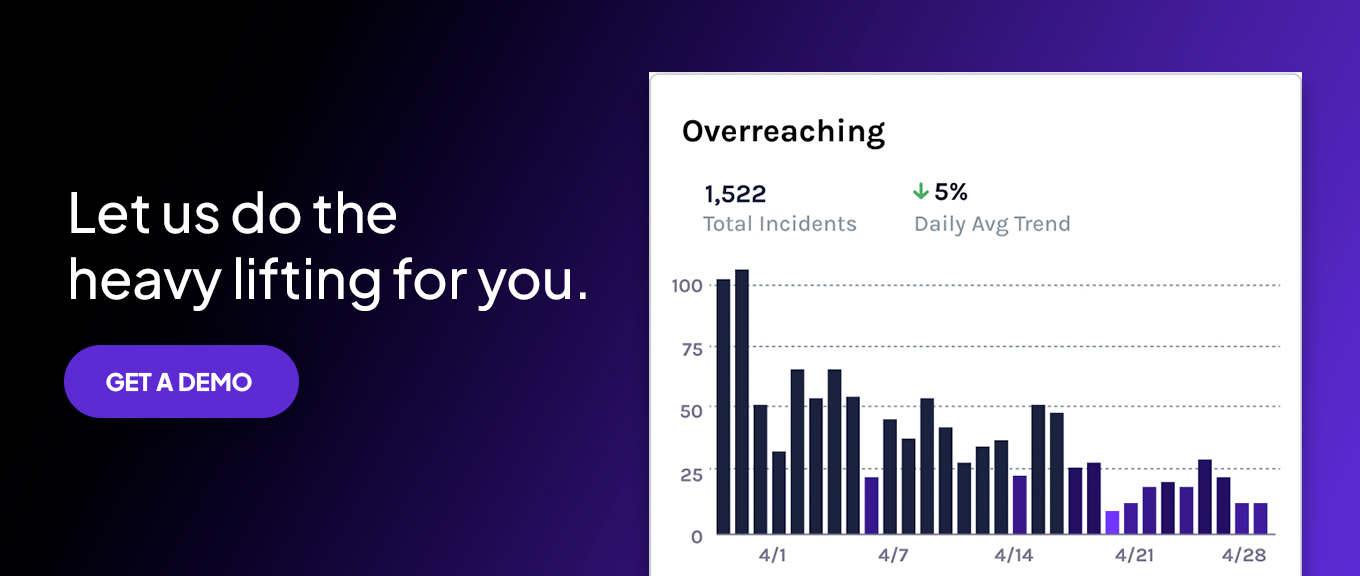Last week, we attended the RILA (Retail Industry Leaders Association) Asset Protection Conference in Dallas. It was full of amazing presentations and conversations from retail leaders, law enforcement representatives, and technological innovators. A major theme at the conference was the expanding role of AI, so we were excited to see that employee safety, asset protection, and AI technology are increasingly interconnected.
Here are three main takeaways conference that all safety leaders in retail should know:
- Stopping ORC (Organized Retail Crime) is a top priority
- AI is everywhere across retail operations
- Trauma-informed leadership to strengthen safety culture

1. Stopping ORC (Organized Retail Crime) is a top priority
The main theme of this year’s RILA Asset Protection Conference was combating ORC (Organized Retail Crime), which has skyrocketed in the last few years. Retailers saw a 26.5% increase in large scale crime from 2020 to 2021 and all indications are that the rate has continued to rise. RILA recently estimated that organized retail crime costs retailers nearly $70 billion per year.
While the focus on crime and asset protection was mostly on retail stores, supply chain theft and asset protection was also a concern. Deloitte recently reported in the Wall Street Journal that “more than one-quarter of professionals polled (28.9%) say their organizations experienced supply chain fraud, waste or abuse during the past 12 months, yet nearly as many (26.8%) have no program currently in place to prevent and detect those risks."
Which is why methods to minimize ORC and overall shrink were ever present at the conference - presentations with CLEAR (Coalition of Law Enforcement and Retail), theft investigation workshops, and a plethora of innovative tech like AI to protect customers, employees, and profits.
One area discussed last week was parking lot monitoring. We spoke to a national supermarket retailer, who told us they have specific high risk stores subject to ORC. They believe that an extended parking duration may be an indicator of casing the store in advance of a theft. When it comes to AI, computer vision could be added to parking lot security cameras to identify and flag anomalous behavior, like suspicious vehicles. This integration could be a new frontier for companies focused on both preventing theft and protecting employees.
AI is already used to identify unsafe workforce behaviors. Our site-intelligence platform prevents safety incidents before products reach the store shelves by monitoring off-limit pedestrian zones, PIT parking durations, and more. So we were not surprised by the second trend at the conference…
2. AI is everywhere across retail operations
Retailers are looking to AI for all kinds of operations solutions, not just theft-protection. AI is in high demand for preventing product damage, counting inventory, tracking pallets, and so much more. One area in which AI shows amazing results is safety. Retail safety leaders are ahead of the curve by utilizing AI that not only protects employees, but also increases operational efficiency.
Voxel’s AI-powered site intelligence platform is all about keeping workplaces safe by spotting risky behaviors. However, it's not just about employee safety; it also helps catch issues with products. Take, for example, a situation where Voxel spotted a large obstruction near some moving forklifts. It turned out to be more than 50 pieces of frozen product that had tumbled from 45 feet up. This was not only a near-miss accident for the workers involved but also a case of significant product damage—what we call shrink.
In another scenario, Voxel was monitoring for risky ergonomic behaviors, such as overreaching, when it also captured a cascade of products falling from about four pallets high. This could have been a potential injury, not to mention damaged cases everywhere. While catching such instances of shrink is a valuable bonus, the true power of Voxel lies in its ability to seamlessly blend safety and operational efficiency—making it a crucial tool for modern retail operations.

3. Trauma-informed leadership to strengthen safety culture
The third trend we saw at the 2024 Retail Asset Protection Conference highlighted exemplary safety leadership, particularly in supporting employees who have faced trauma. Given the unfortunate prevalence of shootings, theft, and work-related accidents in retail, it's crucial for safety leaders to effectively support employees recovering from such events.
Safety leaders must know how to support employees post-trauma by prioritizing their safety and emotional well-being, encouraging open dialogue, and providing coping resources after an incident. Workplace trauma often affects more employees than initially apparent—those directly involved, witnesses, colleagues, and even those working in the incident area suffer indirect trauma.
Dr. John W. Jones from Fifth Theory gave an insightful presentation on trauma-informed leadership, highlighting six key competencies that safety leaders should demonstrate to help manage trauma and ultimately strengthen safety culture.
- Safety: Creating a safe workplace that ensures physical and emotional safety, maintains open reporting channels, and focuses on well-being, which ultimately reduces risky employee behaviors, incidents, and overall losses.
- Self-care: Engaging in effective self-care and work-life balance prevents burnout and mental fatigue, which could easily cause unsafe behaviors or accidents.
- Support: Leaders who provide emotional and professional support to all employees cultivate trust and dialogue, making employees feel valued and strengthening their safety culture.
- Empathy: By listening with empathy and understanding employees' unique situations, leaders can thoughtfully tailor policies and preventive measures.
- Fairness: Valuing fair and inclusive behavior ensures equitably application of policies. Fair and inclusive workplaces tend to have a stronger safety culture with higher employee morale and lower turnover.
- Trustworthiness: Maintaining high ethical standards and integrity inspires trust among employees, customers, and stakeholders.
How Voxel can help
When it comes to asset protection, your employees are your greatest asset to protect. Voxel stands at the forefront to prevent costly incidents while retailers get products out the door safely and quickly. Start your journey to a safer workplace with Voxel.

